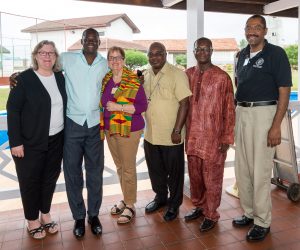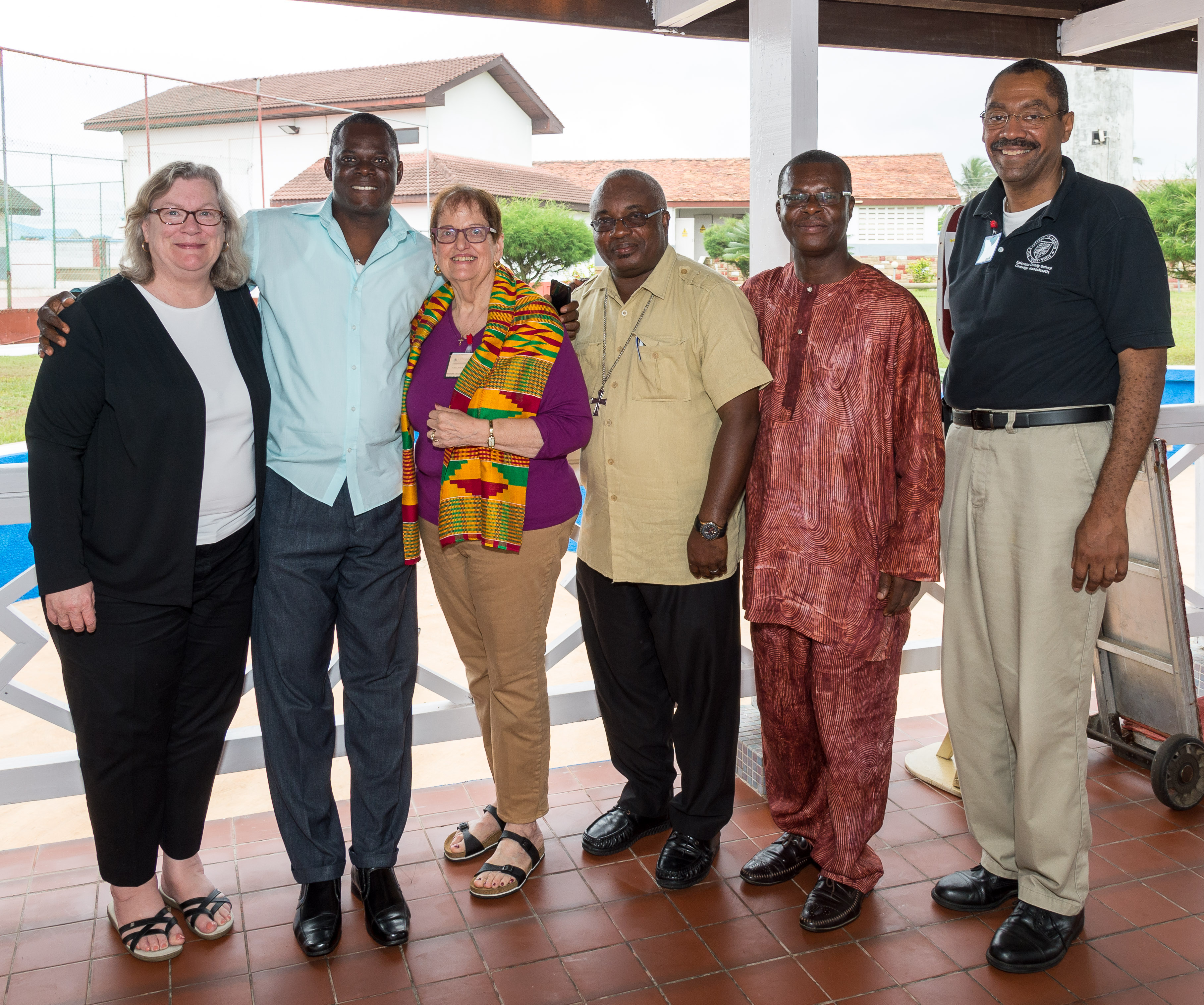
(l-r) President Jennings, Dr. Paul Shaibu Katampu, Deputy Fredrica Harris Thompsett, Bishop Victor Atta-Baffoe, Dr. Emmanuel Isaac Kpakpo Addo and the Rev. Keith Patterson
In mid-September, a group of African Anglicans, members of other African churches, and Episcopalians held a consultation on the Bible and sexuality in Elmina, Ghana. House of Deputies President Gay Clark Jennings and Deputies Brian Baker, Lowell Grisham, Fredrica Harris Thompsett, and Bonnie Perry participated in the meeting, which was held at the invitation of Bishop Victor Atta Baffoe of the Anglican Diocese of Cape Coast.
Other Episcopal participants in the Elmina Consultation included the Rev. Broderick Greer, Bishop Jeffrey D. Lee, Dr. Dora Mbuwayesango, Sara Miles, Kathleen Moore, Jim Naughton, the Rev. Keith Patterson, Bishop Sean Rowe and Rebecca Wilson.
The group, which has met three times in the last four years, issued a statement at the conclusion of the gathering, called the Elmina Consultation. African scholars, church leaders and activists from eleven countries in sub-Saharan Africa have been involved in the three consultations, which have also included Episcopal Church bishops, clergy, and laypeople invited by the Chicago Consultation. Baker, Grisham, and Perry are co-conveners of the Chicago Consultation, along with Deputy Jennifer Adams, and Jennings is a founding member.
“We call upon our faith communities to make either public commitment or private arrangement to serve as places of sanctuary for those who live under the threat of violence for working on behalf of the gospel,” reads the statement. “We understand this group to include LGBTI people, women and men living with HIV, ethnic, racial and religious minorities on both continents, and those who are potential victims of gender violence.”
Baker, who also participated in the group’s 2013 consultation in Limuru, Kenya, said that the Elmina Consultation “helped me realize that animus in Africa toward gay and lesbian persons was not necessarily indigenous but rather was imported and inflamed by activists in the U.S.” Relationships among Anglicans, he says, can help undo the damage. “The sustainability of the Anglican Communion is not dependent on relationships between primates,” Baker said, “but rather on relationships that are forged between individuals working across the Communion to draw us closer to the kingdom of heaven.”
At the gathering, participants discussed Resolution A051 of the Episcopal Church’s 2015 General Convention and, in their statement, called upon the Episcopal Church to fulfill it. The resolution supports using resources developed by African Anglican leaders and organizations working to curb anti-gay and anti-transgender violence and building relationships with African Anglican scholars whose biblical interpretations affirm the dignity and humanity of LGBTI people.
“What I love about this resolution is that it’s one we can make a reality on our own,” said Perry. “We as individuals, congregations and dioceses can bring this resolution to fruition; we don’t have to depend on a government or outside organization to take action.”
At All Saints’ Episcopal Church in Chicago, where Perry is rector, even the children are involved. “Every year our Africa Bake Auction, led by our 9 and 10 year olds, nets about $22,000 and the kids allocate a portion of that money to people who are working on LGBT issues in Africa as well as supporting our work in South Sudan,” Perry said. “When the kids found out that someone’s livelihood and family’s economic security would be at risk because they spoke out for LGBT issues, they thought that was wrong.”
During their time in Ghana, Elmina Consultation participants visited Cape Coast Castle, where millions of enslaved Africans were imprisoned before being forced on to slave ships by European captors. “The church must be ever mindful of its own history as oppressors even as it pursues its vocation as a liberator,” reads their statement. “Within the walls of this slave fort, a church was built directly atop a dungeon, making achingly clear the complicity of the Anglican church in the enslavement of Africans.”
“I am a fifth generation white Southerner, and every molecule in my body was affected by walking through Cape Coast Castle,” Grisham said. “First, by the horrors of what we can do to another human being. I don’t know whether I was more horrified by the corporate sin or the individual moral failure of my people. Secondly, I was humbled by the courage, strength and endurance of every single enslaved person who survived those tortures to come and plant their families as my neighbors. We have so much more work to do to confront human prejudice and oppression. I’m glad to do the little bit of my part of that work in my generation on behalf of the LGBTI neighbors as well as my African and African American brothers and sisters.”
Together with Grisham, Elmina Consultation participants reflected on the need for both personal and corporate remedies for racism and homophobia. “And because we understand that the church must not only act as Good Samaritans to those who are robbed and beaten but also work at the systemic level to make safe the road from Jericho to Jerusalem walked by everyone who strives for just and fair societies and full inclusion in the Body of Christ,” the statement concludes, “we pledge to work collaboratively in opposing the legacy of colonialism and its present day manifestations, to stand against all principalities and powers (Ephesians 6:12, Romans 8:38-39), and to understand that these evils are rooted in ideologies of power and domination that have no place in the church or in our societies.”


